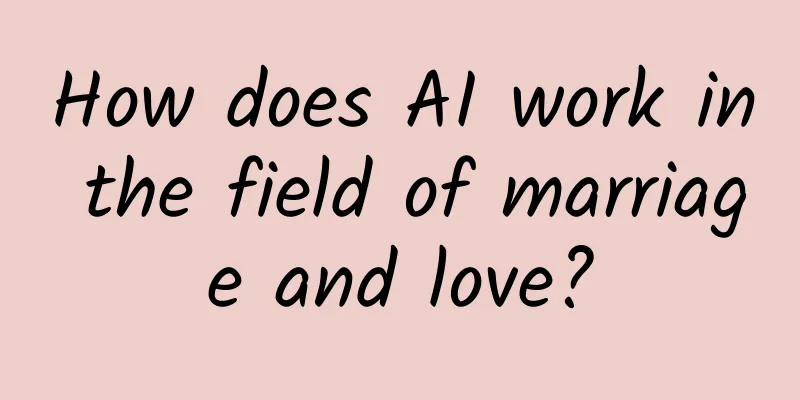How does AI work in the field of marriage and love?

|
Since December 2018, the Japanese government has conducted a questionnaire survey on 3,980 unmarried men and women aged 20-40 who wish to get married, and announced the results of the survey on the marriage tendency of Japanese people through Japanese media on January 8 this year. The survey shows that only 27% of people think that "marriage is a matter of course", 68% of them answer that "it is possible not to get married", and 60% of them think that "even if you get married, you can have no children". The highest proportion of people aged 30-39 who accept that they can stay single for life is 88%. As high as 70% of people agree not to get married, setting a record high since the survey began 25 years ago. When asked whether they had taken any action to find a partner, 61.4% of the respondents said they had not taken any action. In particular, 72% of men in their 20s answered that they had not taken any action. Japanese media said that this shows that young men today have a relatively negative attitude towards finding a partner. When asked why they did not plan to get married, the report showed that 46.8% of people answered "I have not met the right person", 26.6% answered "I do not have enough money to get married", and 24% answered "I cannot get along well with the opposite sex". Therefore, the report concluded[1] that one of the main reasons why men and women aged 20-40 do not get married is "I have not met the right person". Based on the survey results, the Japanese government published a white paper on measures to cope with a declining birthrate on the 18th. The white paper pointed out that many people have the intention to get married but do not take action, and the government needs to support these people, such as creating a variety of matchmaking activities for young people in and outside the workplace to increase the chances of finding a suitable partner. More importantly, the white paper also introduced a novel initiative in Ehime Prefecture, Japan: using AI to help young people match suitable marriage partners. In reality, AI is not so "sci-fi" when it comes to solving marriage and love problems. However, in recent years, there have been many dating apps that use personality, appearance and other information for big data matching, but most of them remain in the dating direction. Japan hopes that AI can help users find partners with the purpose of marriage and a longer-term relationship. However, before we start discussing what new features AI dating brings to interpersonal relationships, let us first review how we met our soulmate in the past when there was no Internet, and how this method has changed in modern times. Basically, at that time, the most popular way to meet a new potential marriage partner was "friend recommendation". With the faster pace of work and life, changes in urban neighborhood relations and other factors, the friend recommendation model has gradually become "less reliable". There are roughly three reasons for this: First, the total amount is small. Usually our circle of friends is much smaller than our circle of activities. There are usually not many friends who are recommended by friends, that is, friends who don’t have a partner, so there are very few people to screen. In today’s Japan, where everyone lives a comfortable and satisfied life, it is easy to hold the attitude of “better to have nothing than to have something bad” and just look around. In contrast, through big data matching, all potential objects in a time period and a specified area can be tested for a round of conditions, and the amount will be much larger. Second, it is time-consuming. Usually, if a friend recommends someone, you have to meet them for the sake of face. If you are busy at work, you have to rush to the other side of the city after work to meet someone you will most likely never see again in your life, which is quite energy-consuming for many people. If you arrange three meet-ups in a week, you may have a shadow on the idea of meeting someone in the future. Especially for those otakus who already have difficulty finding a partner, meet-ups push them into the abyss of fear. Online blind dates, relatively speaking, only allow the two parties to meet when the recognition range of each other is relatively high, and there is no time concern at all. Third, face. If a potential partner is introduced by a friend, there are many things to worry about before meeting. For example, if you don’t feel very good after meeting, will it offend your friend? If you feel that there is a 10% chance of dating, and both parties try it out but end up breaking up, will you no longer be able to be friends with your friend? As mentioned above, the "friend recommendation" model is gradually becoming ineffective in modern people's marriage and love life. It is so difficult to meet a real-name goddess/sister that it is no wonder that people sigh, "Being single is fun for a while, and being single forever is fun." In fact, this issue is also the biggest pain point of the group that the Japanese white paper focuses on, which has led the Japanese government to explore the possibility of using AI to solve marriage and love problems and put it into practice. Ehime Prefecture, mentioned in Japan's "White Paper on Countermeasures for a Declining Birthrate Society", is a relatively successful case in this practice. Ehime Prefecture first organized group dating (group blind dates) for single young men and women in 2008 by volunteers, but due to the above factors, the results were not ideal at first. In 2011, after AI was introduced to screen and match participants in group blind dates, the success rate of blind dates increased by 16%. A pair of unknown potential dating partners must fall in love with each other after browsing limited dating information. The so-called "falling in love with each other" usually requires meeting three major conditions: visual "love at first sight", social reality conditions, and personality matching. In traditional dating or marriage organizations and websites, these three conditions face several subdivision problems: 1. Although dating websites all have photos, the total number of users is also considerable. It is difficult for a new user to know where to start their "first sight". 2. Social reality conditions such as occupation, salary, and education level can be filled in directly, but people are often unwilling to expose too much of their information directly to strangers. 3. Not to mention personality. The "personality" in the traditional model is more like metaphysics, and there is no standard that can be intuitively reflected. AI's approach to solving these three problems is nothing more than three steps: quantification, feature extraction, and matching. Taking visual love at first sight as an example, love at first sight seems to be a more complicated issue. Users often cannot say what they like before they "meet the right person". But once characterized, all human beings have one nose, one mouth, two eyes and two ears. Everyone's preference for appearance is subject to the data changes of each element of the five senses. Although people cannot accurately describe their exact numbers for each element, we can save the situation by inputting "dream lover". AI can first check whether the user has a favorite celebrity or two-dimensional character through the hobbies and other information entered by the user, and then search the database to see if other users' photos match the key features of the celebrity or two-dimensional character, thereby screening out whether there is a suitable "Dream Man"/"Dream Girl" in the database. In addition, marriage and love "successful cases" can also be training sets for AI matching: we can enter the wedding photos of people who have successfully married in the district office or city office (Civil Affairs Bureau) into the photo library (training set) for AI learning. If one party (assume to be A) starts searching, we first find someone similar to A in the photo library, and then start searching for photos of the other party B, and then match people similar to B in our registered database. What if we still haven't found a suitable person to recommend? Don't panic. There is a saying that "people always like people who look like themselves". People who look like themselves should not only look similar to themselves, but also have similar personalities, interests and hobbies. So here we have to start thinking about how to solve the problem of personality matching: In terms of personality, we can still use the above feature point extraction to process it. Social reality conditions can be matched through the user's life circle or physical life trajectory, such as consumption level, activity area, credit card bills, etc. At the same time, this information can appear invisible in recommendations between users, avoiding directly revealing information such as salary and occupation to strangers. Of course, personality is more important when living together. In the past, matchmakers often based their judgment on the degree of personality matching between the two parties on their own subjective judgment. Just like "love at first sight", quantification, feature extraction and matching of personality is an action that is even more difficult to accomplish in the artificial era, which is also the reason why many relationships end in tragedy. In this area, we can start with some of the user's online behavior data - what kind of emoticons they like to send when chatting, what kind of games they like to play, what kind of websites they like to browse, what kind of videos they like to watch, what kind of music they listen to, or what kind of movies they like, etc. The reverse training set from successful marriage cases can also contribute to the accuracy of this matching. Okay, let's imagine that we are one of the parties in this matching system. Then, through the algorithm, we can solve the most difficult problem from knowing each other to getting along with each other: there is a potential partner who is compatible with you in terms of personality and chemistry - Well, he is not far from me, come out and meet him - Yeah, I also like the dishes you ordered - Yes, yes, I am also following this drama recently - You actually play this game too, which zone are you in? Let's play together. Then both parties meet their parents. Since they are well matched (social conditions match), both parents nod their heads in agreement and the marriage is concluded. |
<<: Apple's search advertising revenue is expected to reach 2 billion in 2020
Recommend
What are the treatments for second degree cervical erosion?
Second-degree cervical erosion is moderate erosio...
The first time was painful but no bleeding
Does it hurt a girl's first time? Many people...
Bleeding a week before your period
Menstruation is the monthly menstrual period for ...
Several ways to care for your skin during pregnancy
The physical health of pregnant women is an issue...
I have had lower abdominal pain for almost a month since my abortion.
Female friends may experience many abnormal condi...
How often should breast massage be given?
Breast massage has a purpose. Of course, in addit...
New protective clothing is here!
Although it is the beginning of autumn, the weath...
What are the benefits of eating red dates with walnuts? How to make sesame red dates with walnuts
In recent years, a kind of snack is very popular,...
How to remove the mole above the left corner of a woman's mouth
Women's love of beauty is natural, and there ...
Dysmenorrhea pain index
Menstruation is a physiological reaction for wome...
Know a little about “medicine” | Can I breastfeed while taking insulin?
Ms. Wu was diagnosed with gestational diabetes du...
Excessive discharge during pregnancy
After pregnancy, due to the influence of hormones...
Is rheumatic fever hereditary during pregnancy?
Rheumatic diseases are common in life. Most middl...
Do girls usually grow taller at the age of 16?
Girls are still underage at the age of sixteen, s...









